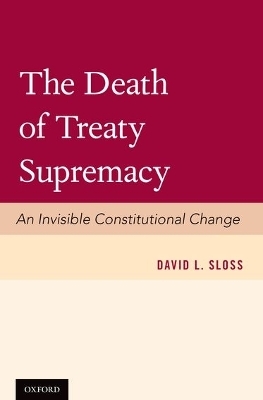
The Death of Treaty Supremacy
Oxford University Press Inc (Verlag)
978-0-19-936402-2 (ISBN)
David L. Sloss is Professor of Law and Director of the Center for Global Law and Policy at Santa Clara University Law School. Professor Sloss focuses his scholarship on the application of international law in domestic courts, with specializations in international human rights law, treaties, U.S. foreign relations law, and constitutional law. He is the editor of The Role of Domestic Courts in Treaty Enforcement: A Comparative Study (2009), and co-editor of International Law in the U.S. Supreme Court: Continuity and Change (2011). He has published numerous articles on the history of U.S. foreign affairs law and the judicial enforcement of treaties in domestic courts. Professor Sloss received his B.A. from Hampshire College, his M.P.P. from the Kennedy School of Government at Harvard, and his J.D. from Stanford Law School. He taught for nine years at Saint Louis University School of Law.
List of Tables
Acknowledgments
Introduction
Part One: Treaty Supremacy at the Founding
Chapter One: The Origins of Treaty Supremacy, 1776-1787
Chapter Two: State Ratification Debates
Chapter Three: Treaty Supremacy in the 1790s
Part Two: Treaty Supremacy from 1800 to 1945
Chapter Four: Foster v. Neilson
Chapter Five: Treaties and State Law
Chapter Six: Self-Execution in the Political Branches
Chapter Seven: Self-Execution in the Federal Courts
Chapter Eight: Seeds of Change
Part Three: The Human Rights Revolution
Chapter Nine: Human Rights Activism in the United States: 1946-48
Chapter Ten: The Nationalists Strike Back: 1949-51
Chapter Eleven: Fujii, Brown and Bricker: 1952-54
Chapter Twelve: Business as Usual in the Courts: 1946-65
Chapter Thirteen: The American Law Institute and the Restatement of Foreign Relations Law
Part Four: Treaty Supremacy and Constitutional Change
Chapter Fourteen: Treaty Supremacy in the 21st Century
Chapter Fifteen: Invisible Constitutional Change
List of Abbreviations Used in Endnotes
Endnotes
Bibliography
Index
| Erscheinungsdatum | 16.10.2016 |
|---|---|
| Verlagsort | New York |
| Sprache | englisch |
| Maße | 236 x 165 mm |
| Gewicht | 953 g |
| Themenwelt | Recht / Steuern ► EU / Internationales Recht |
| Recht / Steuern ► Öffentliches Recht | |
| Recht / Steuern ► Rechtsgeschichte | |
| Sozialwissenschaften ► Politik / Verwaltung ► Europäische / Internationale Politik | |
| Sozialwissenschaften ► Politik / Verwaltung ► Politische Theorie | |
| Sozialwissenschaften ► Politik / Verwaltung ► Staat / Verwaltung | |
| ISBN-10 | 0-19-936402-8 / 0199364028 |
| ISBN-13 | 978-0-19-936402-2 / 9780199364022 |
| Zustand | Neuware |
| Haben Sie eine Frage zum Produkt? |
aus dem Bereich


